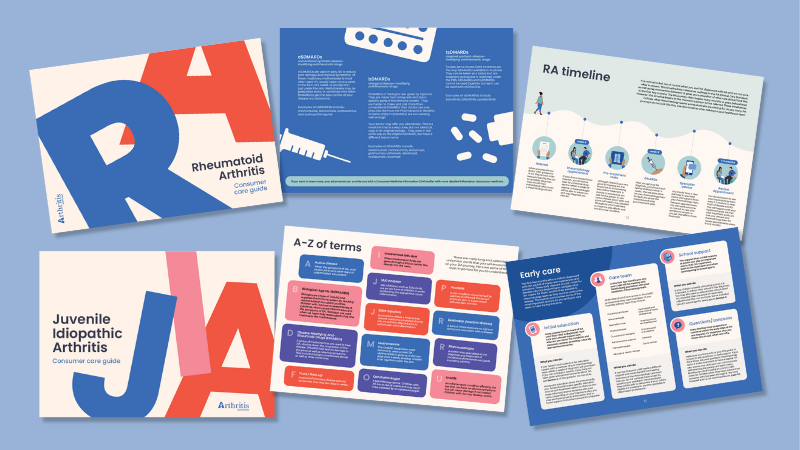

Naomi Creek (National Coordinator) & Rosemary Ainley (Team Writer) at the CreakyJoints Australia stand. The CreakyJoints Australia USB wristband.
In May, CreakyJoints Australia was delighted to once again attend the Australian Rheumatology Association Annual Scientific Meeting, this year held in Melbourne. The meeting was held in conjunction with the Australian Rheumatology Health Professionals’ Association and included Paediatric Rheumatology.
This ARA conference featured many noted Australian and international speakers and a diverse range of topics such as the new frontiers in rheumatology, the role of biosimilars, the benefits of targeted exercise in treating arthritis, and the use of big data in research.
In the main hall were display stands staffed by representatives from the major pharmaceutical companies, the ARA, and peak industry and research bodies including Arthritis Australia and MOVE muscle, bone, and joint health.
CreakyJoints Australia representation
CJA was also set up in the main hall, with our large banner visible as attendees entered, and many made the point of seeking us out to find out more about us.
Our display featured brochures and handouts highlighting our Patient Council and the work we have been doing through advocacy and on our website. Our CJA branded USB wrist bands were a novelty that quickly became the ‘must have’ item of the conference. These were pre-loaded with all our literature so that all those who did not have much time to stop and chat with us could still read about us in their own time and share the files with others.
Media sessions on the latest in arthritis treatment
As consumer/media representatives, we were especially delighted to be invited to attend 2 closed media sessions.
New treatments for potentially crippling arthritis featured Professor Catherine Hill, Clinical Rheumatologist and Epidemiologist from the University of Adelaide and Associate Professor Susanna Proudman, Head of Rheumatology at the Royal Adelaide Hospital. Supporting them were two patient representatives, Crystal Watts and Anna Kostar.
Hill and Proudman spoke of how the relatively new family of non-biologic disease-modifying anti-rheumatic drugs (nbDMARDs) known as Janus Kinase (JAK) inhibitors have been revolutionising treatment for conditions such as rheumatoid arthritis as they can be taken in tablet form yet can be as affective for many as biologic DMARD therapies. The JAK inhibitors currently available for rheumatoid arthritis in Australia are Xeljanz® (tofacitinib) and Olumiant® (baricitinib).
The use of biosimilar DMARD therapies was also a focal point of this session. Biosimilars are almost identical copies of original biologic medications such as Remicade® (infliximab) and Enbrel® (etanercept). Tablet-form generic medications are exact copies of their original medication brands. However, as biologics contain organic cells, they are impossible to replicate precisely.
Biosimilars are as safe and effective as their corresponding biologics for the treatment of many autoimmune conditions when used by patients who have not used the original biologic before or who are only switched once from a biologic to its biosimilar. However, there is controversy around the potential for patients to have adverse reactions if ‘switched’ back and forward between the biologic and its biosimilar as there has not yet been enough research done in this area.
We were pleased to see that the patient representatives, Watts and Kostnar, were featured in this media session as they gave a real-life view of the adjustments we have to make due to arthritis, the difficulty in explaining arthritis to others (especially when you are young), and the difference that treatments such as Humira can make for many in improving quality of life.
Sore knees; exploding myths and getting the right exercise prescription featured Dr Martin Englund, Professor of Clinical Epidemiology and Orthopaedics at Lund University in England and Dr Christian Barton, Research Physiotherapist at La Trobe Sport and Exercise Medicine Research Centre in Melbourne.
Together, they outlined how evidence now shows that knee arthroscopies for degenerative problems, such as meniscus tears, make little or no difference to symptoms when compared to placebo treatments and can actually lead to further problems. Englund and Barton also pointed out that tailored exercise therapy plays a big role in reducing or eliminating symptoms so they are strong advocates for its inclusion in many arthritis treatment regimes.
(To learn about the role of exercise in treating chronic illness, you may like to watch SBS Insight – Season 2018 – Episode 21 – The Exercise Pill in which Barton makes an appearance.)
What’s next?
We attended as many sessions as we could over the 4 days that we felt would be of interested to our readers. We’ve taken extensive notes which will be used as a basis for many more articles soon to be featured on this page.
To keep up to date with our latest articles, be sure to sign up for our free CJA membership and monthly e-newsletter.




